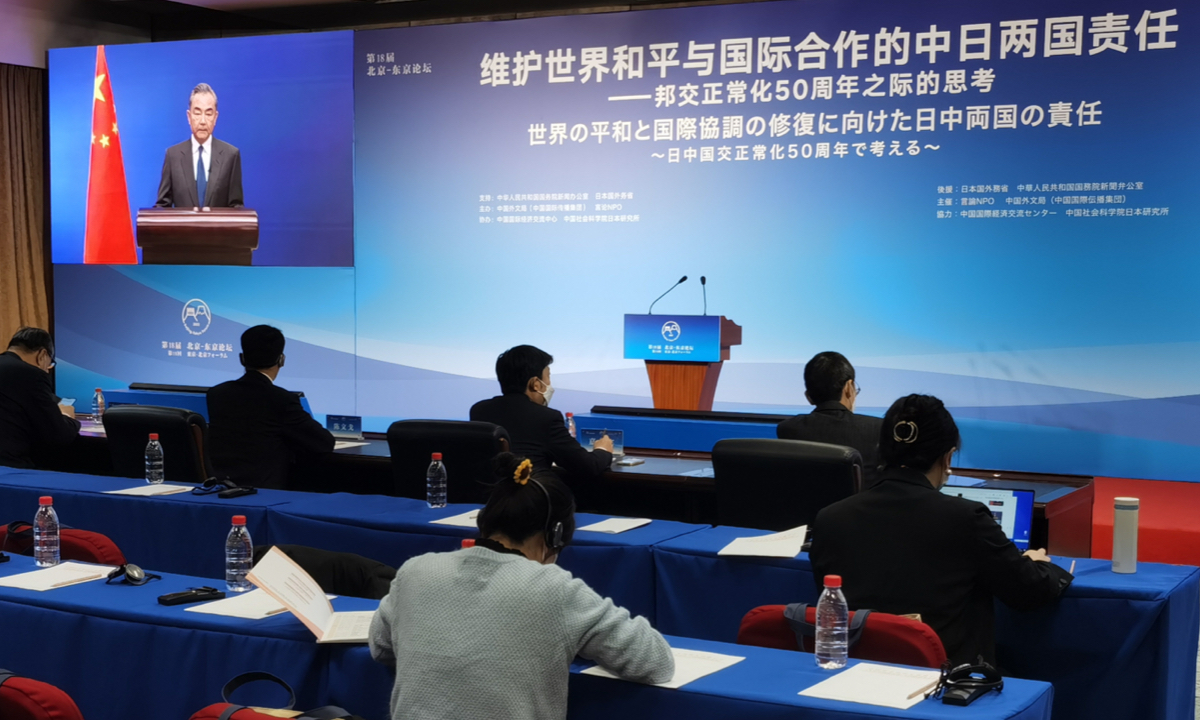Officials, experts underline dialogue, restoration of peaceful order for future China-Japan ties at key forum

Chinese State Councilor and Foreign Minister Wang Yi delivers a speech via video link at the 18th Beijing-Tokyo Forum. Photo: Courtesy of China Foreign Languages Publishing Administration
As this year marks the 50th anniversary of the normalization of China-Japan diplomatic relations and next year is the 45th anniversary of the signing of the China-Japan Treaty of Peace and Friendship, Chinese State Councilor and Foreign Minister Wang Yi put forward a five-point suggestion on strengthening bilateral ties at the 18th Annual Beijing-Tokyo Forum via video link, stressing that major and sensitive issues such as the history and Taiwan, which bear on the political foundation of bilateral ties, should be handled properly in particular and relevant commitments must be honored.
Supported by China's State Council Information Office (SCIO) and Japan's Ministry of Foreign Affairs, and jointly held by the China Foreign Languages Publishing Administration and Japan's think tank Genron NPO, the 18th Annual Beijing-Tokyo Forum opened on Wednesday in Beijing and Tokyo simultaneously in online and offline formats.
As a significant part of the forum, the results of the 2022 China-Japan relations public opinion survey showed that compared with 2021, 60.1 percent of Chinese respondents’ perceptions of Japan remained basically stable. Also, 71.3 percent of Chinese respondents highly recognized the importance of China-Japan relations, supported multi-field cooperation between China and Japan in regional affairs, and hoped that the two countries can strengthen cooperation to address global issues.
Also, according to the survey, issues such as history and territorial disputes continue to influence Chinese respondents' perceptions of China-Japan relations, with 56 percent saying that territorial disputes are the most important problem hindering the development of bilateral ties. In addition, 71.3 percent of Chinese respondents believe that the influence of the geopolitical game between China and the US should be kept to a minimum or ignored, so as to develop China-Japan cooperative relations.
In a video speech at the opening ceremony of the forum, Wang Yi, also a member of the Political Bureau of the Communist Party of China (CPC) Central Committee, said that China and Japan should treat each other with sincerity and strive for peaceful coexistence. "Differences between the two sides should be properly handled in accordance with the existing consensus and newer consensus should be constantly sought," he said.
He noted that, as important countries in Asia and the world at large, the two should shoulder their due responsibilities, step up communication and coordination, practice real multilateralism, promote regional peace, stability and integrated development, and jointly address global challenges.
"Looking forward to the next 50 years, we should make the right choice that lives up to our forefathers, work together to build a China-Japan relationship that meets the needs of the new era, and jointly usher in a new era of development and revitalization for Asia," Wang said, adding that China is ready to work with Japanese friends in all sectors to make unremitting efforts in this regard.
Another important guest – Sun Yeli, deputy head of the Publicity Department of the CPC Central Committee – said via video that the two sides should renew their original aspiration of establishing diplomatic ties and keep to the right direction of peace and friendship, deepen economic and trade cooperation and strengthen the bond of mutual benefit, and promote cultural and people-to-people exchanges to consolidate popular support for bilateral friendship.
Sun expressed his hopes that media outlets and think tanks on the two sides can further strengthen exchanges and cooperation, contribute insights and build broad consensus for China-Japan friendship while youth exchanges should also be deepened.
Japanese Foreign Minister Yoshimasa Hayashi said via video that since the normalization of Japan-China diplomatic relations 50 years ago, under the guidance of the strategic thinking and political courage of the leaders of the two countries, the two sides have made tangible progress in political, economic, cultural and personnel exchanges. The two countries have broad space for cooperation and many common tasks.
Hayashi urged the two countries, as major nations that shoulder important responsibilities for regional and global peace and prosperity, to carry out candid dialogue and deepen cooperation.
This year, themed "The future of China-Japan relations: how to restore peaceful order and international cooperation,” the two-day forum serves as a high-level and large-scale interactive exchange platform between the two countries with guests from the political, economic, business, academic and media sectors of China and Japan.
Hot-button issues such as the Russia-Ukraine conflict, the Taiwan question and the Diaoyu Islands issue have been covered at the forum.
Experts from the two countries, although holding varied views on some issues, have reached consensus on pushing forward more dialogue, managing differences and seeking peaceful coexistence.
Yasuo Fukuda, former Japanese prime minister, said at the forum that the two sides must objectively recognize what has caused tensions in the bilateral relations, try their best to eliminate the factors causing tensions, discard prejudice, return to the track of dialogue and cooperation, deepen the relationship of trust, and not let a single issue affect the overall situation of bilateral ties.
Wang Wen, professor and executive dean of the Chongyang Institute for Financial Studies at Renmin University of China, expressed his disappointment that in recent years, Japan's diplomacy has lacked strategic thinking and historical significance, and has completely turned to the US, especially in its China policy.
He urged some Japanese politicians to refrain from interfering in China’s internal affairs including the Taiwan question and Xinjiang-related affairs.
Photos
Related Stories
- Chinese path to modernization sets example for developing countries: Japanese scholar
- Chinese FM calls for joint efforts to make China-Japan relationship fit for new era
- China urges Japan to be cautious in words and deeds in military, security fields: FM spokesperson
- Premier Li says sound, stable China-Japan ties serve interests of both sides
- Symposium held to enhance China-Japan friendship
- Interview: Japan, China should be backbone of building community with shared future for mankind -- former Japanese PM
- Interview: Decoupling from China would put Japanese companies at risk of survival: Japanese economist
- Feature: Terracotta Warriors exhibition highlights cultural bond between China, Japan
- Exports a top priority for Japan, and China can help
- Sino-Japanese talks gather momentum
Copyright © 2022 People's Daily Online. All Rights Reserved.









